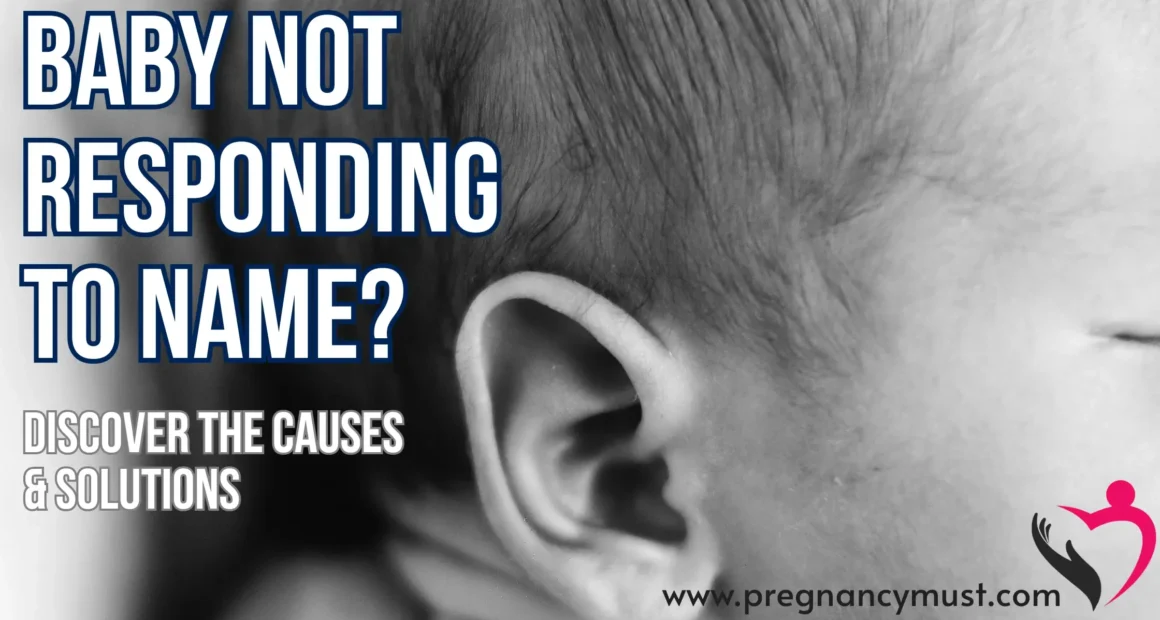Parenting comes with unlimited confusion and challenges. If you are noticing your baby not responding to name can be an issue of concern. While it’s normal to worry, it’s important to know that various factors could be at play. Sometimes, it can be just a simple matter, as your little one is just busy with an activity. But it may also be an early symptom of developmental concerns.
Table of Contents
Baby Not Responding to Name – What Does It Mean?
Being parents, one of the most common worrying situations is when a child not responding to name constantly. Even after attempting multiple times, if the baby is not paying attention, then it’s a matter of great concern. Babies mostly start to identify and respond to their names when they are 6 to 9 months old. However, if your baby doesn’t respond to name even after this age span, it’s important to find the possible reasons.
When Babies Recognize Their Name
Parents often have a question, “When do babies recognize their name?”. It generally takes almost 6 months for babies to recognize their name. At the age of 9 months, babies become consistent in responding to their name. We should bear in mind that every baby is unique. Some babies achieve developmental goals taking time a bit longer.
When Do Infants Respond to Their Name?
While it may vary, most infants respond to their name when called by a familiar voice, especially in a quiet environment. If your baby not responding to name occurs frequently even in distraction-free settings, it could indicate an issue worth discussing with your pediatrician.
Common Reasons for a Baby Not Responding to Name
- Hearing Issues: One of the first considerations should be a potential hearing problem. Conducting a basic hearing test can help rule this out.
- Attention and Focus: Sometimes, your baby doesn’t respond to name simply because they are deeply focused on a toy or activity.
- Developmental Delays: If your baby not responding to name is a consistent issue, it might be related to developmental disorders such as autism spectrum disorder (ASD).
- Language Delays: Babies with speech or language delays might not associate their name with themselves yet.
Autism and Baby Not Responding to Name
A significant concern among parents is whether their baby not responding to name might indicate autism. While it’s not a definitive sign, research shows that lack of name response after 12 months can be an early indicator. If your child also exhibits limited eye contact, repetitive behaviors, or delayed speech, consulting a specialist is crucial.
Signs of Autism Related to Name Recognition
- Lack of interest in social interaction
- Rarely looking when called by name
- Limited use of gestures or pointing
- Preferring to play alone
How to Help Your Baby Respond to Their Name
If your baby not responding to name worries you, here are some strategies that may help:
- Positive Reinforcement: Call your baby’s name while making eye contact and rewarding them with a smile or cheer when they respond.
- Engage with Activities: Use interactive games that involve calling their name, like peek-a-boo.
- Routine Calling: Incorporate name recognition into daily routines, such as during feeding or playtime.
- Minimize Distractions: Practice name calling in quiet, calm environments to encourage attention.
When to Seek Professional Help
If your baby doesn’t respond to name consistently by the age of 12 months, it may be time to seek guidance from a pediatrician or an early intervention specialist. They may conduct hearing tests or developmental screenings to understand the underlying cause.
Consult a Specialist If:
- Your baby is over 12 months and rarely responds to their name.
- There are additional signs of developmental delay.
- Your baby shows limited social interaction or communication skills.
Final Thoughts
While it’s understandable to feel anxious when your baby not responding to name, it’s important to observe the context. Often, it’s a phase that resolves as your child grows. However, if concerns persist, early assessment can make a significant difference. Addressing potential issues sooner rather than later helps ensure that your baby receives the support they need. Explore our Q&A for helpful tips and essential guidance.









